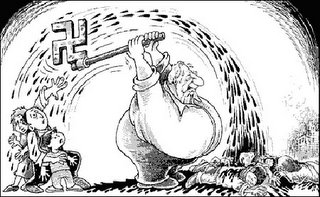Good on Julian Pistorius (who blogged it), Tim Wikiriwhi, Helen Hughes (all 2005 Libz candidates) and other Libz members and supporters who went to Waitangi to protest – against those who advocate using the Treaty as a means of separating New Zealand politically into two states.
.
As PC has pointed out, the Treaty was not the basis for a future constitution. I like Stephen Frank’s interpretation which states that the Treaty essentially was Maori ceding overall governance of New Zealand to the British Crown (which later devolved virtually all of that to a New Zealand government), while Maori were guaranteed property rights over what they owned. A good starting point at best, where you have full control over your body and your property, while the government exists to protect that and arbitrate on disputes between you and your neighbours.
.
Unfortunately the Treaty has come to mean many things to different people – the partnership it embodies for some was relevant in 1840 – when there were two representative collectives – the tribes that signed the Treaty and the British Crown. However, today all New Zealand citizens elect representatives at the central and local government level, and everyone’s views through that system have relatively equal merit (democracy then being a head counting exercise). To say that I as a New Zealanders born not of Maori descent (I think. I was adopted so have no idea about one side of my ancestry) have less right to be consulted or have my views considered that one who is, is sheer racist nonsense. Nobody is special because of their ancestry – Hitler believed people were – so does Slobodan Milosevic.
.
As PC has pointed out, the Treaty was not the basis for a future constitution. I like Stephen Frank’s interpretation which states that the Treaty essentially was Maori ceding overall governance of New Zealand to the British Crown (which later devolved virtually all of that to a New Zealand government), while Maori were guaranteed property rights over what they owned. A good starting point at best, where you have full control over your body and your property, while the government exists to protect that and arbitrate on disputes between you and your neighbours.
.
Unfortunately the Treaty has come to mean many things to different people – the partnership it embodies for some was relevant in 1840 – when there were two representative collectives – the tribes that signed the Treaty and the British Crown. However, today all New Zealand citizens elect representatives at the central and local government level, and everyone’s views through that system have relatively equal merit (democracy then being a head counting exercise). To say that I as a New Zealanders born not of Maori descent (I think. I was adopted so have no idea about one side of my ancestry) have less right to be consulted or have my views considered that one who is, is sheer racist nonsense. Nobody is special because of their ancestry – Hitler believed people were – so does Slobodan Milosevic.
.
All who wish should use, promote and sustain the Maori language and cultural traditions - New Zealand would be worse off if this did not happen - but it should thrive because people want it, and get a sense of life from it, not because they feel obligated to do so. Most of all, as long as a language, traditions, culture and beliefs are consistent with people being able to live their lives happily, and make choices about how they want to live, let it live. It would be mundane indeed if we were monolingual and had the same tastes and traditions. With the explicit and implicit racism of the past behind us, it is time to look forward. We are not one people, we are 4 million people, there should not be homogenisation, because all individuals are different and will live in different ways. Being Maori or Chinese or being a New Zealander is one expression of this, but it is not THE expression.
.
The main grievance claimed under the Treaty is the theft of property in the name of the Crown mainly in the 19th century. It is appropriate that this be investigated and, if the Crown still owns the property concerned, that it be returned. It is also appropriate that the Crown consider whether state or council held land could be in better stewardship by local iwi, especially if there is regular iwi or hapu usage. As long as private property rights of others are protected and recognised, the rights of those who had their land stolen should be. Having said that, the laws of evidence must be upheld. The High Court should undertake this task, instead of the Waitangi Tribunal, which should be wound up. This will ensure objectivity and politics around settling claims are avoided, but also mean that decisions can be appealed and the court rulings are binding – unlike the findings of the Waitangi Tribunal. It will mean claims for satellite orbital slots become irrelevant – but claims over fisheries and lands are not. It will give iwi the incentive to get it right and courts to be fair, and not political. The traditional left will fear the court system as much as the traditional right fears binding rulings on land claims - but this is about doing right against state theft.
.
I will not repeat what others have said, but I believe New Zealand should become a constitutional republic – IF (and it is a BIG if), it protects the life, bodies, liberty and property of adults, and restricts the state to acting to protect those goals. However, nobody in the republican movement in New Zealand believes in this, at all.
.
I will not repeat what others have said, but I believe New Zealand should become a constitutional republic – IF (and it is a BIG if), it protects the life, bodies, liberty and property of adults, and restricts the state to acting to protect those goals. However, nobody in the republican movement in New Zealand believes in this, at all.

